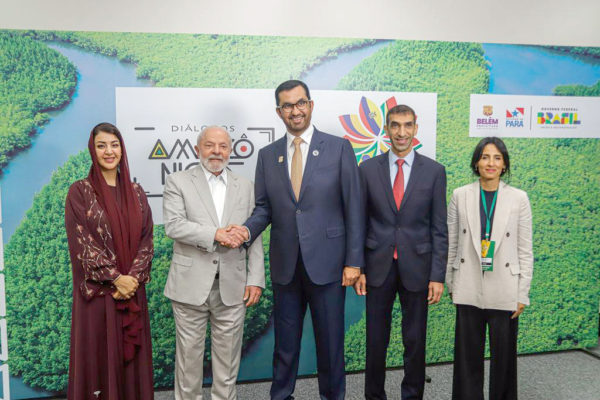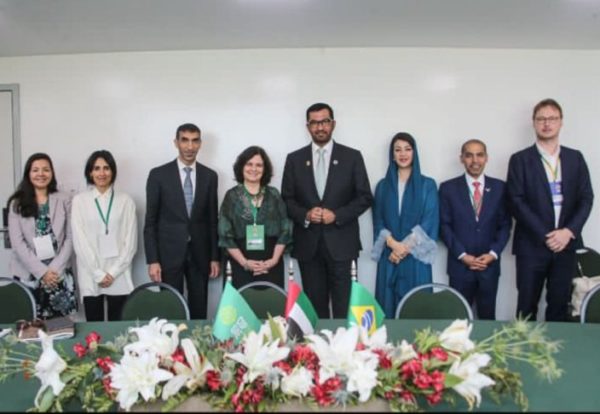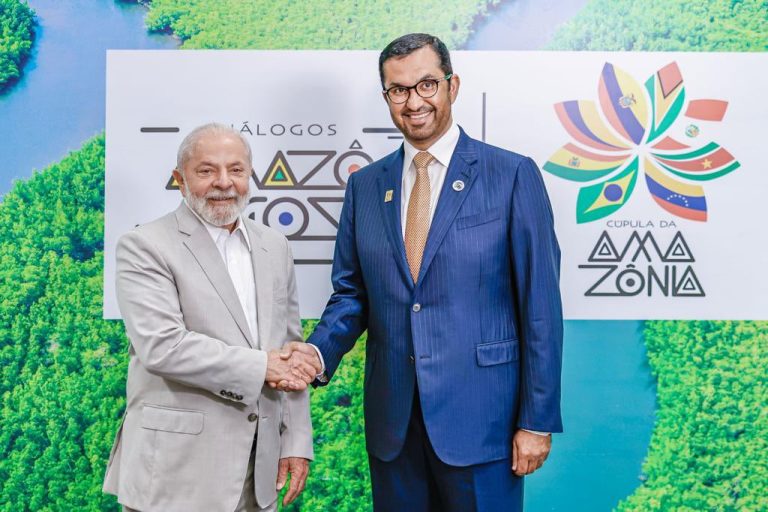São Paulo – Energy transition, a wider social participation in COP28 debates, and potential partnerships in infrastructure works with foreign investment. These were some of the topics of the bilateral meeting between the Brazilian president, Luiz Inácio Lula da Silva, and the president-designate of the upcoming UN climate summit COP28 Sultan Ahmed Al-Jaber. They spoke moments before the official activities of the last day of the Amazon Summit last Wednesday (9) in Belém, Brazil.
The event in the capital city of the Brazilian Northern state of Pará brings together heads of eight Amazonian countries – Bolivia, Colombia, Venezuela, Peru, Guyana, Suriname, Ecuador, in addition to Brazil – and, this Wednesday held a round of debates with guests from countries with extensive tropical forests such as Congo, the Democratic Republic of Congo, and Indonesia, as well as representatives from France, Norway, and international organizations.
The purpose is for countries with large reserves of tropical forests to take to COP28 – to be held from November 30 to December 12 in Dubai, in the United Arab Emirates – a series of jointly defined positions. The first was expressed in the Declaration of Belém, released this Tuesday (8). With over 100 paragraphs, the document lists commitments and priorities for protecting forests and their people in areas such as sustainable development and fighting hunger and inequality.
The president-designate of COP28 welcomed the initiative of the Amazonian Countries Summit and expressed his intention to give the event the most significant possible impact. President Lula reinforced his intention to ensure just like the Amazon Summit, the climate conference has the most excellent possible participation of civil society in the dialogue with the heads of state.
Al-Jaber highlighted the vital role the G20 nations play in driving climate action. Brazil is a group member. He praised president Lula’s leadership in reducing deforestation in Brazil by 34% in the last six months and the goal of zero illegal deforestation by 2030.

Lula and Al-Jaber also discussed the potential for cooperation between the UAE and Brazil in areas such as energy transition and investments in infrastructure. Sultan Ahmed Al-Jaber conveyed greetings from the president of the UAE and emir of Abu Dhabi, Mohammed bin Zayed Al Nahyan, and the desire to strengthen relations between the two countries.
President Lula pointed out on Friday (11) the Brazilian government will launch its new Growth Acceleration Program (PAC). This initiative envisions hundreds of infrastructure projects throughout Brazil and could receive investments from other countries.
During the Amazon Summit, the minister of Health of Brazil, Nísia Trindade, also met with the president of COP28 and his delegation. On her Twitter, Nísia said they discussed “how to deal with the effects of climate change, which affect especially vulnerable populations, like many who live in the Amazon.”
Sultan Ahmed Al-Jaber’s delegation includes the UAE’s Minister of Foreign Affairs and International Cooperation, Reem Al Hashimy; Minister of Foreign Trade, Thani bin Ahmed Al Zeyoudi; director-general of COP28, Majid Al Suwaidi; and the high-level champion of Climate Change of the United Nations for COP28, Razan Al Mubarak.
Speech
Al-Jaber also delivered a speech at the Amazon Summit, as the Emirates News Agency (WAM) reported. “You are the guardians of a vital and delicate ecosystem that sustains life, lives, and livelihoods, not just for the peoples of the Amazon region, but the planet we all share,” he said.
In his speech, Al-Jaber praised president Lula for defending bold policies prioritizing indigenous peoples and serving as a model for other regions. He also took the opportunity to engage with leaders in Brazil – expected to host COP30 in 2025 – to build a bridge between COP28 and COP30 to ensure inclusive, resilient, and lasting climate progress.
“We will draw on the experience and lessons the Amazon Cooperation Treaty Organization (ACTO) and indigenous peoples can teach us in advancing the dual objective of protecting and restoring nature while advancing sustainable development.”

During his visit to Brazil, Al-Jaber met with world leaders to discuss the COP28 energy transition agenda, including Luis Arce, president of Bolivia; Gustavo Petro, president of Colombia; Félix Tshisekedi, president of the Democratic Republic of Congo; and Mark Phillips, prime minister of Guyana.
The president of COP28 also met with the minister of Indigenous Peoples of Brazil, Sonia Guajajara, and indigenous leaders from the Amazon region. He also had bilateral meetings with Brazil’s minister of the Environment, Marina Silva; minister of Foreign Affairs, Mauro Vieira; president of Petrobras, Jean Paul Prates; vice president of Innovation, Technology, and Sustainable Development of Braskem, Antonio Queiroz, among others.
“We will place the rights of indigenous peoples at the forefront of our approach to nature. Although they make up 5% of the global population, indigenous communities protect over 80% of our biodiversity,” said Al-Jaber.
Translated by Elúsio Brasileiro




